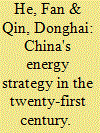| Srl | Item |
| 1 |
ID:
068992


|
|
|
| 2 |
ID:
144855


|
|
|
|
|
| Summary/Abstract |
In 2014, the amount of RMB cross-border settlement had reached RMB7.6tn. It is important to evaluate the potential influence of RMB internationalization on China's macroeconomy. In the present study, a framework that includes monetary supply and demand was created to analyze the influences of RMB cross-border settlement on China's domestic interest rate, asset price and foreign exchange reserves. It is found that RMB settlement in different BOP items leads to very different effects on China's real economy and the financial market. Based on the analysis, we provide a framework of the policy priorities for RMB internationalization, with the RMB cross-border settlement items divided into three groups with different priorities. Meanwhile, to support RMB internationalization, exchange rate reforms should be adopted as a priority and a prudent attitude maintained regarding capital account liberalization.
|
|
|
|
|
|
|
|
|
|
|
|
|
|
|
|
| 3 |
ID:
076894


|
|
|
|
|
| Publication |
2007.
|
| Summary/Abstract |
Pegging the RMB exchange rate to the Asian currency unit (ACU) has not, at least in the short term, been proved a better solution than pegging to the US dollar or pegging to a G-3 (US$, Japanese yen and euro) currency basket. Although the Asian currency unit can help Asian economies to keep the relative price of regional currencies stable, the cost of joining a formal regional monetary cooperation is the relinquishment of the autonomy of their domestic policies. Asian monetary cooperation needs to provide more potential benefits if it is to attract Asian economies. We argue that Asian monetary cooperation should be designed to solve the problem of regional trade imbalance, and regional exchange rate policy coordination should be adopted as the first step towards exchange rate cooperation
|
|
|
|
|
|
|
|
|
|
|
|
|
|
|
|